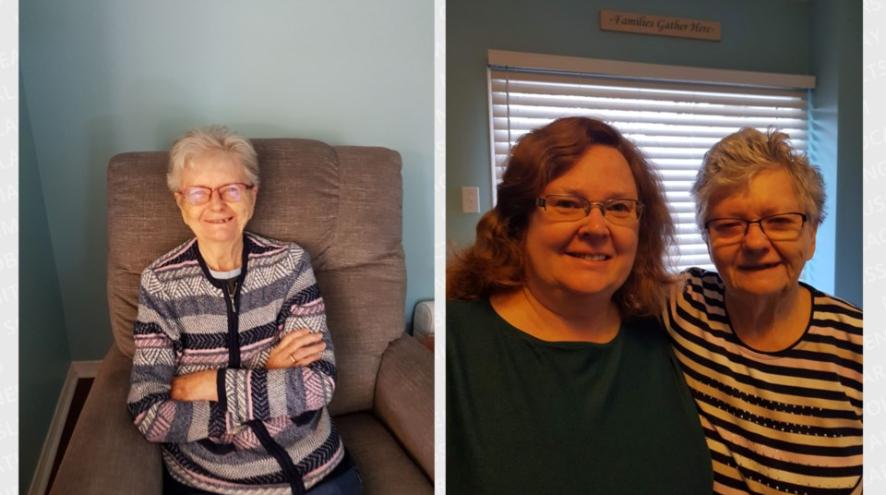January is Alzheimer’s Awareness Month
Newmarket’s Jane Kennedy has three pieces of advice for people who are looking after someone living with Alzheimer’s disease: Get support as soon as you can; stay informed about how the disease progresses; and adjust to those changes as they happen.

Newmarket’s Jane Kennedy has three pieces of advice for people who are looking after someone living with Alzheimer’s disease: Get support as soon as you can; stay informed about how the disease progresses; and adjust to those changes as they happen.
She also has suggestions on what not to do: Don’t wait too long to get support – reach out to your local Alzheimer’s Society as soon as possible. Don’t argue with the person living with the disease because what they say is true to them. And most importantly, “Don’t beat yourself up. “You are really doing the best that you can,” Kennedy said.
Kennedy’s mom, Eileen Howatt, passed away in January 2022 after a five-year battle with Alzheimer’s disease. Alzheimer’s disease is one of the most common causes of dementia, which is an “umbrella term for a set of symptoms caused by physical disorders affecting the brain,” according to the Alzheimer Society of Canada. Alzheimer’s disease accounts for between 60 to 80 per cent of all diagnoses.
Howatt lived with Kennedy and her family for five years before she was diagnosed with Alzheimer’s disease.
“Our lives carried on as normal,” Kennedy said. “Mom continued to stay at home alone during the day while we were at work and school. At the end of the day, she would meet our youngest at the bus stop. Over time she would miss picking her up at the bus stop. She would get confused about what time to go to the bus stop and sometimes went in the wrong direction. Then one day she couldn’t find her way home after a snowfall. She returned to the wrong house and the person living in that house contacted the police, who then brought my mom home. The police officer was very clear that this will happen again, and we needed to have a safety plan in place.”
Kennedy said at that point she was connected to the Alzheimer Society of York Region (AS York), through a social worker. Her mom started attending AS York’s DAY program and later Kennedy started attending a caregiver support group.
“The (DAY) program was a very good fit for her because she was always social, and this provided the socialization she needed,” Kennedy said.
It was also important for Kennedy and her family.
“As a caregiver, you don’t realize how much you need the break until you actually get it.”
Kennedy said she was in denial when her mom was first diagnosed with Alzheimer’s disease. She said she thought she could care for her mom with the support of her husband and brother. Kennedy said she wished she reached out earlier for support and encourages those new on the dementia caregiving journey to do just that.
“People should reach out to AS York for respite. Your person needs the social interaction that the caregiver can’t provide because they are tired and exhausted. You need this more than you may think because you cannot do this alone. Once you connect with the support group and find others going through what you are going through, you can finally breathe again.”
As her mom’s illness progressed, Kennedy and her family adapted the way they behaved to make sure her mom remained safe at home. This included her husband sleeping on the couch once her mom started sundowning, a term Kennedy learned about through her AS York support group.
“As her illness progressed, we continued to adapt to the changes as best we could.”
It wasn’t until her mom passed away in 2022 did Kennedy realize how much she was doing.
“I honestly felt empty in the beginning and didn't know how to handle my time. It all felt so different because it just stopped. I never thought about what it would be like when it stops. It was painful; because as tiring and stressful as it was, I would do it all over again in a heartbeat.
Last summer, Kennedy and family were able to gather in Halifax, Nova Scotia, to bury her mom’s ashes.
“It was so important to see my siblings and be with them, as we had not been able to grieve together since mom passed. We needed the time together to reminisce and share our grief with each other. This was the closure we all needed. For two years, I kept mom’s bedroom door closed. For me I was able to move forward because once we returned home, I cleaned out her room and painted it. I finally felt at peace with her passing. Grief is different for everyone, and I guess that's how it was for me.”
Kennedy reminds caregivers that everyone’s story looks different.
“This is my story. Everyone has a different story. Please share your stories because caregivers need to hear them! It reaffirms that you are doing OK and, most importantly, you are not alone. Realizing that I wasn’t alone was a huge step in accepting my mom’s diagnosis and progression with the disease.”
January is Alzheimer’s Awareness Month, a time to raise awareness about dementia and its impact on York Region residents. This month, AS York encourages York Region residents to book a free workshop or lunch and learn and learn about brain health and how to reduce your risk of developing dementia. Learn more.
